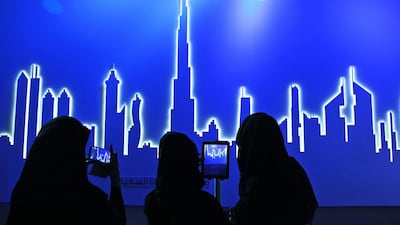With more than 54 per cent of the world’s seven-billion-plus population living in cities, most economies are ill-equipped to deal with the resulting strain on resources and infrastructure.
Fortunately, a city is not a stagnating place. It is also a process – and the future holds solutions.
Constant technological innovation gives rise to urban dynamism. Brand new cities are taking shape, using digital technology to revolutionise the way these ecosystems function.
Over the past decade, places like Songdo International Business District in South Korea, King Abdullah Economic City in Saudi Arabia, Barcelona, Hamburg and Guayaquil in Ecuador have redefined the concept of city – by introducing unprecedented levels of digital intelligence to homes, streets, utilities, as well as to education and health infrastructures.
The Dubai Smart City initiative is also surging ahead with purpose and clarity. Not only are policymakers building an enviable digital infrastructure, but they are also familiarising citizens with the ecosystem.
One of the main tasks of making urban life possible revolves around delivery and maintenance of utilities – power, water and traffic.
In a smart city, a network that weaves data and real-time information from all utilities into a single architecture sets it apart. This single network – digital architecture – is the difference between existing city services that work in silos and futuristic services where intelligent machines can work together, anticipate problems and compute solutions.
“Intelligence”, then, is the key to creating living environments that seamlessly tie up services while conserving energy.
In smart cities, sensor systems can track the flow and use of electricity, heat and water to the point where waste can be eliminated. Radio frequency identification-enabled vehicles, refrigerators with computational power, programmable thermostats and other forms of automation herald a new age of sustainable living. Urban farming that uses climate control in a building can become a reality. Telepresence and cloud services will enable virtual interaction, potentially rendering the office we know to disappear in another decade.
Much of this is already happening. The Dubai Energy and Water Authority is working on a smart grid that enables residents to instal photovoltaic panels on their rooftops, collect solar energy and sell power back into the grid.
Digitisation of services, an integral part of the new smart city, is also under way.
The UAE Government has made more than 95 per cent of its most important services available through mobile apps and aims, by next year, to ensure that 80 per cent of residents accessing government services do so via mobile devices. The complexity and engineering challenge of building and maintaining this architecture of connectivity also represents opportunities for the private sector to develop solutions and products. To put this into perspective, the public and private-sector IT market in Dubai alone is valued at Dh17.9bn over the next five years, including a public sector opportunity of Dh4.3bn.
This is, however, under-explored territory, which deserves greater attention. Private companies pioneering into smart cities may not find it immediately remunerative. Bidding for contracts can be prohibitively expensive and negotiating with national governments highly challenging. Fortunately, the UAE Government has set precise collaboration targets between government agencies, businesses and citizens, setting benchmarks for the wider region.
We have now entered an information-laden reality where automated intelligence, data management, privacy and cybersecurity raise more questions than answers. This is the time to embrace new possibilities and make the future city more reliable, safe and efficient.
Caspar Herzberg is the president of Schneider Electric's Middle East and Africa division and the author of Smart Cities, Digital Nations, which will be published by Roundtree Press some time this year
business@thenational.ae
Follow The National's Business section on Twitter

